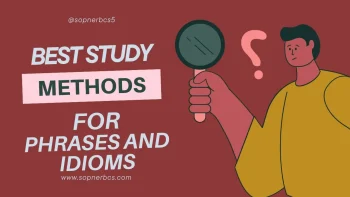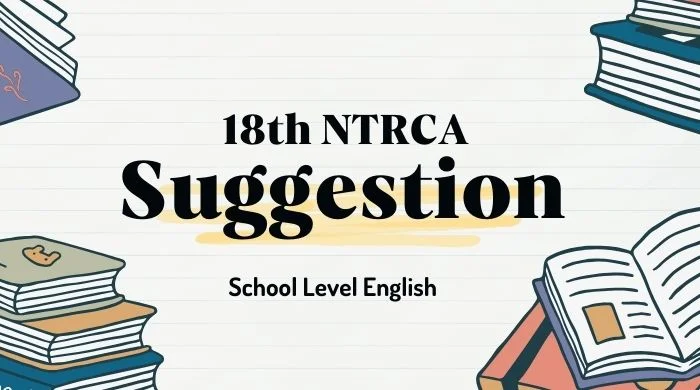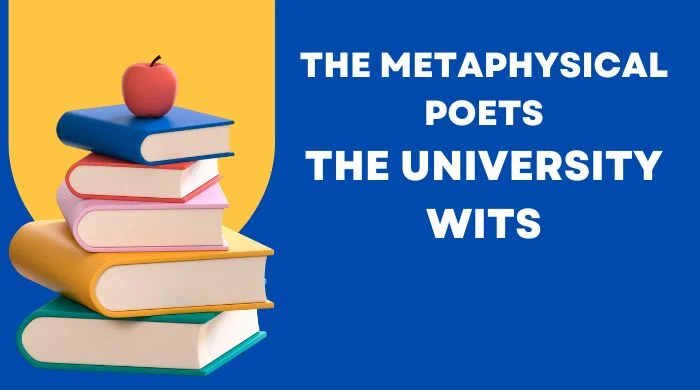Phrases and Idioms
18th NTRCA School Level Written Suggestion Phrases and Idioms একটি গুরুত্বপূর্ণ অংশ। নিম্নে পরিক্ষায় আসার মতো কিছু Phrases and Idioms বিশ্লেষণ করা হলো।
Phrases and Idioms
Head in The Clouds: The phrase “head in the clouds” is an idiom that typically refers to someone who is not paying attention to what is happening around them because they are lost in their own thoughts or dreams. It suggests that the person is disconnected from reality and may be preoccupied with imaginative or unrealistic ideas. They may seem absent-minded or distracted, often daydreaming or thinking about things unrelated to their current situation or responsibilities. Phrases and Idioms
“Head in The Clouds” Phrase টি সাধারণত এমন কাউকে বোঝায় যে তাদের চারপাশে যা ঘটছে তাতে মনোযোগ দিচ্ছে না কারণ তারা তাদের নিজস্ব চিন্তা বা স্বপ্নে হারিয়ে গেছে অর্থাৎ দিবাস্বপ্ন দেখছে। যে ব্যক্তিটি বাস্তবতা থেকে বিচ্ছিন্ন এবং কল্পনাপ্রসূত বা অবাস্তব ধারণা নিয়ে ব্যস্ত থাকে। তারা অনুপস্থিত-মনের বা বিভ্রান্ত বলে মনে হতে পারে, প্রায়শই দিবাস্বপ্ন দেখে বা তাদের বর্তমান পরিস্থিতি বা দায়িত্বের সাথে সম্পর্কহীন বিষয়গুলি নিয়ে চিন্তা করে।
Hobson’s choice: “Hobson’s choice” is a phrase that refers to a situation in which someone is presented with only one option or course of action, effectively having no real choice at all. It originates from the story of Thomas Hobson, a livery stable owner in Cambridge, England, during the 16th and 17th centuries. Hobson rented out horses, but he would only offer customers the horse nearest the door, refusing to let them pick any other horse. Thus, customers had no real choice—they could take the horse offered to them or none at all. Phrases and Idioms
“Hobson’s choice” একটি Phrase যা এমন একটি পরিস্থিতিকে নির্দেশ করে যেখানে যে ক্ষেত্রে যা দিতে চাওয়া হয় তাই নিতে হবে না হলে নেয়ার সুযোগ হারাতে হবে। এটি ১৬ এবং ১৭ শতকে ইংল্যান্ডের কেমব্রিজে a livery stable owner গল্প থেকে উৎপত্তি হয়েছে। হবসন তার ঘোড়াগুলি ভাড়া দিতেন, কিন্তু তিনি গ্রাহকদের কেবল দরজার কাছের ঘোড়াটি অফার করতেন, তাদের অন্য কোনও ঘোড়া বাছাই করতে দিতেন না। এইভাবে, গ্রাহকদের কোন নিজের পছন্দ ছিল না – তারা তাদের দেওয়া ঘোড়াটি নিতে পারে বা কোনটিই নয়।
In modern usage, “Hobson’s choice” is often used to describe a situation where it appears there are multiple options available, but in reality, all options lead to the same outcome or there is only one viable choice. It highlights the illusion of choice when there is actually none. Phrases and Idioms
বর্তমানে, “Hobson’s choice” phrase টি এমন একটি পরিস্থিতি বর্ণনা করতে ব্যবহৃত হয় যেখানে মনে হয় একাধিক বিকল্প অপশন থাকে, কিন্তু সব অপশন একই ফলাফলের দিকে নিয়ে যায় বা পছন্দ করার জন্য শুধুমাত্র একটি কার্যকর অপশন থাকে। এটি পছন্দের বিভ্রমকে হাইলাইট করে যখন আসলে কিছুই থাকে না।
“hale and hearty“: The phrase “hale and hearty” is an idiom used to describe someone who is in robust health and full of energy. It implies that the person is physically strong, hearty, and in good condition. “Hale” means free from disease or infirmity, while “hearty” suggests warmth, enthusiasm, and vigor. So, when someone is described as “hale and hearty,” it means they are in excellent health and spirits.
“hale and hearty” বাক্যাংশটি এমন একটি বাগধারা যা এমন কাউকে বর্ণনা করতে ব্যবহৃত হয় যিনি শক্তিশালী এবং শক্তিতে পূর্ণ। যে ব্যক্তি শারীরিকভাবে শক্তিশালী, হৃদয়বান এবং ভাল অবস্থায় রয়েছে। “hale” অর্থ রোগ বা দুর্বলতা থেকে মুক্ত, যখন “hearty” উদ্যম এবং প্রাণশক্তি নির্দেশ করে। সুতরাং, যখন কাউকে “hale and hearty” হিসাবে বর্ণনা করা হয়, এর অর্থ হল তারা শারিরীকভাবে সুস্থ এবং মানসিকভাবে প্রফুল্লতায় রয়েছে।
“hitting below the belt”: The phrase “hitting below the belt” is an idiom that refers to unfair or unethical tactics in an argument, competition, or conflict. It originates from boxing, where hitting an opponent below the belt (i.e., below the waistline) is against the rules and considered unsportsmanlike conduct. Phrases and Idioms
“hitting below the belt” একটি বাগধারা যা যুক্তি, প্রতিযোগিতা বা দ্বন্দ্বে অন্যায় বা অনৈতিক কৌশলকে বোঝায়। এটি বক্সিং থেকে উৎপত্তি, যেখানে প্রতিপক্ষকে বেল্টের নিচে (অর্থাৎ, কোমরের নিচে) আঘাত করা নিয়মের পরিপন্থী এবং খেলাধুলার মতো আচরণ বলে মনে করা হয়।
Metaphorically, “hitting below the belt” means to unfairly attack someone in a way that is considered excessively harsh, mean-spirited, or outside the bounds of what is considered fair or acceptable behavior. This could involve making personal attacks, bringing up sensitive topics, or using tactics that exploit vulnerabilities or weaknesses. Essentially, it implies that the action is unfair and goes beyond the acceptable boundaries of conduct. Phrases and Idioms
রূপকভাবে, “hitting below the belt” মানে অন্যায়ভাবে কাউকে এমনভাবে আক্রমণ করা যা অত্যধিক কঠোর, খারাপ-উৎসাহ, বা ন্যায্য বা গ্রহণযোগ্য আচরণ বলে বিবেচিত সীমার বাইরে। এতে ব্যক্তিগত আক্রমণ করা, সংবেদনশীল বিষয় উত্থাপন করা বা দুর্বলতা বা দুর্বলতাকে কাজে লাগানোর কৌশল ব্যবহার করা জড়িত থাকতে পারে। মূলত, এটি বোঝায় যে কর্মটি অন্যায্য এবং আচরণের গ্রহণযোগ্য সীমানা অতিক্রম করে।
“hard nut to crack”: The expression “hard nut to crack” is an idiom used to describe something or someone that is difficult to understand, solve, or deal with. It often refers to a complex problem, a challenging situation, or a person who is resistant to influence or change. Phrases and Idioms
“hard nut to crack” অভিব্যক্তিটি এমন একটি বাগধারা যা এমন কাউকে বর্ণনা করতে ব্যবহৃত হয় যা বোঝা, সমাধান করা বা মোকাবেলা করা কঠিন। এটি প্রায়শই একটি জটিল সমস্যা, একটি চ্যালেঞ্জিং পরিস্থিতি বা প্রভাব বা পরিবর্তনের প্রতিরোধী এমন একজন ব্যক্তিকে বোঝায়।
When you describe a problem or a person as a “hard nut to crack,” you’re essentially saying that it’s tough to find a solution or to make progress because of the complexity, difficulty, or resistance involved. It’s like trying to crack open a hard nut, which requires a lot of effort and persistence. Phrases and Idioms
আপনি যখন একটি সমস্যা বা একজন ব্যক্তিকে “hard nut to crack” হিসাবে বর্ণনা করেন তখন আপনি মূলত বলছেন যে জটিলতা, অসুবিধা বা প্রতিরোধের কারণে সমাধান খুঁজে পাওয়া বা অগ্রগতি করা কঠিন। এটি একটি শক্ত বাদাম ফাটানোর চেষ্টা করার মতো, যার জন্য অনেক প্রচেষ্টা এবং অধ্যবসায় প্রয়োজন।
‘Hold water’: The phrase “hold water” is an idiom that means something is logical, reasonable, or valid. When an argument, explanation, or theory “holds water,” it means that it is sound and can withstand scrutiny or criticism. Essentially, it implies that the idea or statement is credible and does not have any obvious flaws or inconsistencies. Conversely, if something does not “hold water,” it suggests that it is weak, flawed, or not convincing upon closer examination. Phrases and Idioms
“hold water” বাগধারাটির অর্থ যৌক্তিক, যুক্তিসঙ্গত বা বৈধ। মূলত, এটি বোঝায় যে ধারণা বা বিবৃতিটি বিশ্বাসযোগ্য এবং এতে কোনো স্পষ্ট ত্রুটি বা অসঙ্গতি নেই। বিপরীতভাবে, যদি কিছু “hold water” না থাকে তবে এটি নির্দেশ করে যে এটি দুর্বল, ত্রুটিপূর্ণ বা নিবিড় পরীক্ষায় বিশ্বাসযোগ্য নয়।
“To have one’s nose in the air”: “to have one’s nose in the air”: to be proud/conceited, অযথা গর্বিত হওয়া, নিজেকে অন্যের চেয়ে উত্তম ভেবে কথা না বলা, ভাব দেখানো; She walked past me with her nose in the air. ( সে ভাব দেখিয়ে আমার পাশ দিয়ে হেঁটে গেল)

The expression “to have one’s nose in the air” is an idiom that describes someone who is arrogant, haughty, or disdainful. It implies that the person carries themselves with an air of superiority, looking down on others or behaving in a snobbish manner. The imagery evoked is of someone figuratively raising their nose in the air, suggesting a sense of aloofness or disdain towards others whom they perceive as inferior. Phrases and Idioms
অভিব্যক্তিটি এমন একটি বাগধারা যা এমন কাউকে বর্ণনা করে যে অহংকারী, অহংকারী বা অবজ্ঞাপূর্ণ। এটি বোঝায় যে ব্যক্তি নিজেকে শ্রেষ্ঠত্বের বাতাসের সাথে বহন করে, অন্যের দিকে তাকানো বা নোংরা আচরণ করে। উত্থাপিত চিত্রটি হল একজন ব্যক্তি রূপকভাবে বাতাসে তাদের নাক উঁচিয়ে, অন্যদের প্রতি বিচ্ছিন্নতা বা ঘৃণার অনুভূতি নির্দেশ করে যাদের তারা নিকৃষ্ট বলে মনে করে।
 Sopner BCS Sopner BCS: We fuel your BCS dreams
Sopner BCS Sopner BCS: We fuel your BCS dreams





One comment
Pingback: NTRCA Written Short Suggestion (College) 2024 - Sopner BCS